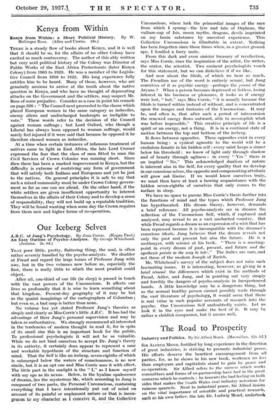Our Iceberg Selves
THAT poor little, pretty, fluttering thing, the soul, is often rather severely handled by the psycho-analysts. We shudder at Freud and regard the large tomes of Professor Jung with awe, but in the two volumes now before us, especially the first, there is really little to which the most prudish could object.
After all, one-third of our life (in sleep) is passed in touch with the vast powers of the Unconscious. It affects our lives so profoundly that it is wise to learn something about that kingdom. Present-day geography of it may be but as the quaint imaginings of the cartographers of Columbus ; but even so, a bad map is better than none.
No volume has yet stated Professor Jung's theories so simply and clearly as Miss Corrie's little A.B.C. It has had the advantage of Herr Jung's personal supervision and may be taken as authoritative. We strongly recommend all interested in the tendencies of modern thought to read it, for in spite of its small size this is an important book for the public. To professional psychologists it will not be so valuable. While we do not bind ourselves to accept Dr. Jung's theory in its entirety, it certainly does appear to represent a sane and workable hypothesis of the structure and function of mind. That the Self is like an iceberg, seven-eighths of which is submerged below the waters of consciousness, is no new simile, but it is an apt one and Miss Corrie uses it with effect. The little part in the sunlight is the " I," as I know myself with my ego as its nexus. Below, in the hyaline opalescence of dreams, lies the mysterious Me, which according to Jung is composed of two parts, the Personal Unconscious, containing everything that I have intentionally put out of mind on account of its painful or unpleasant nature or that is incon- gruous to my character as I conceive it, and the Collective Unconscious, where lurk the primordial images of the race from which I sprang—the lyre and lute of Orpheus, the vulture-cap of Isis, moon myths, dragons, devils imprinted on my brain substance by ancestral experience. This Collective Unconscious is illimitable in extent. Nothing has been forgotten since those times when, as a greater ground ape, I fondled a furry mate.
From this dark and even sinister treasury of recollection, says Miss Corrie, rises the inspiration of the artist, the writer, the orator, the scientist. Two eminent psychologists vouch for this statement, but we can disbelieve it if we like.
And now about the libido, of which we hear so much. The Freudian use of the word is entirely sexual, but Jung conceives of it as psychic energy—perhaps the prang of the Aryans ? When a person becomes depressed or listless, losing interest in his business or pleasures, it looks as if energy were lost, " but," says Miss Corrie, " it is usually because the libido is turned within instead of without, and is concentrated upon the images and fantasies of the Unconscious. It may be, and often is, that after such a period of introversion the renewed energy flows outward, able to accomplish what was before impossible." This creative principle of life is a spirit or an energy, not a thing. It is in a continual state of motion between the top and bottom of the iceberg.
It flows between opposites. These opposites exist in every human being : a cynical agnostic to the world will be a credulous fanatic in his hidden self : every saint keeps a sinner below his threshold : we know of light only through shadow and of beauty through ugliness : in every " Yes " there is an implied " No." This acknowledged .dualism of nature is inherent also in the Self, for every quality that we develop in our conscious selves, the opposite and compensating attribute will grow sub limine. If we would know ourselves truly, we must then have at least a bowing acquaintance with the hidden seven-eighths of ourselves that only comes to the surface in sleep.
We have no space to pursue Miss Corrie's thesis further into the functions of mind and the types which Professor Jung has hypothecated. His dream theory, however, demands a brief reference. All psycho-analysts see in dreams the reflection of the Unconscious Self, which, if captured and analysed, may reveal to us a vast uncharted country. But while Freud regards a dream as an expression of a wish that has been repressed because it is incompatible with the dreamer's conscious ideals, Jung believes that the dream reveals not only the past and present but also the future. He is a soothsayer, with science at his beck. " There is a meeting- point in every dream of past, present, and future and The synthesis points to the way to takr.." The italics are ours, and not those of the modern Joseph of Zurich.
Mr. Whitehead's survey of the subject does not raise such fascinating issues. It is interesting, however, as giving in a brief résumé the differences which exist in the methods of Freud, Adler, and Jung, and in pointing out very simply and forcibly the dangers of psycho-analysis in inexperienced hands. A little knowledge may be a dangerous thing, but as the normal healthy person cannot possibly wade through the vast literature of psychology, it would seem that there is real value in such popular accounts of research into the psyche. Our Unconscious Self undoubtedly exists. Let us look it in the eyes and make the best of it. It may be rather a childish companion, but it means well.


























































 Previous page
Previous page